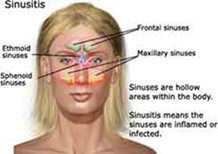Postnasal Drip (PND) may sound to be a trivial problem but it can be a source of nagging irritation. An annoying affliction that can impede a person’s day-to-day functioning, PND is a condition in which a person is constantly struggling with secretions in the throat. Postnasal Drip refers to mucus dripping from the back of the nose into the throat. It is also commonly termed as the upper airway cough syndrome. PND is attended with a constant urge to clear the throat as the flow of the fluid in the throat is irritating. Another offshoot of PND is that the irritants present in the secretions could initiate a cough reflex.
Homeopathic Treatment
Homeopathic medicines for Postnasal Drip help treat the problem effectively. Homeopathy offers remedies for Postnasal Drip that are safe, successful and devoid of side-effects. Since homeopathy uses the body’s own defenses to combat infection, this line of treatment is comparatively non-intrusive. Another advantage these remedies enjoy over others is that they are toxin-free as they are drawn from natural substances.
Top Homeopathic Medicines for Postnasal Drip
The best homeopathic medicines for PND are Hydrastis, Kali Bichrome, Corallium Rubrum, Natrum Mur, Hepar Sulph, Natrum Phos, Sticta, Merc Sol and Allium Cepa.
1. Hydrastis – For Postnasal Drip With Thick Ropy Secretion
I can vouch for the fact that homeopathy assures excellent treatment for Postnasal Drip. One of the top treatments in homeopathy for this condition is hydrastis. It is ideal for situations where the secretions are very thick, ropy and sticky in form. The secretions fall from the posterior nares into the throat. The patient complains of irritation due to a continuous feeling of mucus in the throat. There is a lot of hawking in an attempt to expel the mucus. Usually, thick, yellow mucus is expectorated. Both the nares become raw and the person has a constant urge to blow out from the nose. In case of Postnasal Drip in children, the kid is usually suddenly aroused from sleep due to thick, sticky droppings. The throat feels raw and there is a lot of burning sensation.
2. Kali Bichrome – For Post Nasal Drip With Sinusitis
It is another reliable remedy for Postnasal Drip. It is especially recommended in cases when the secretions are thick, green and ropy in nature. The patient hawks a lot to clear the throat. The root of the nose and the frontal sinus are inflamed, causing a lot of pain and distress to the patient.
3. Corallium Rubrum – For PND With Cough
Corallium Rubrum is a wonderful remedy that covers Postnasal Drip well. Corallium works well in cases where a lot of mucus is secreted through the posterior nares. The patient hawks up a lot of mucus. Along with this, there is cough that is dry and spasmodic. Other that this, there is Nasal Catarrh (nasal discharge from the front of the nose) with abundant secretions. This makes the inhaled air feel very cold.
4. Natrum Mur – To Manage PND Related To Cold Or Nasal Allergy
Natrum Mur is leading homeopathic medicine to help cases of PND associated with cold or nasal allergy. Those needing it complain of mucus dripping from the nose into the throat along with other symptoms of cold or nasal allergy. These symptoms include sneezing, runny nose and watering from eyes. Nose may be blocked sometimes.
5. Hepar Sulph – When PND Is Linked With Cold, Sinusitis
This medicine is beneficial when PND is associated with cold and sinusitis. In cases needing it, there is watery or thick discharge from nose along with sneezing. It gets triggered by cold air. The inhaled air feels cold inside the nose. The mucus dripping in the throat may be blood-stained.
6. Natrum Phos – For Managing Acid Reflux And PND
In cases where a person has acid reflux issues along with PND, this medicine can be considered. This medicine will work at treating acid reflux which is causing PND. When this medicine is required, thick yellow mucus is found dripping in the throat. It gets worse at night waking the sufferer from sleep. The person has to sit up to clear the throat. Besides, symptoms of acid reflux like heartburn, sour burps may be experienced.
7. Sticta – For PND, Blocked Nose And Fullness At the Root Of Nose
Sticta proves effective when there is dripping of mucus in posterior throat and blocked nose. Fullness at the root of the nose is prominent. Nasal blockage gets worse at night that disturbs sleep. There is mucus in the throat that dries soon forming scabs. There is an urge to blow nose but no discharge occurs.
8. Merc Sol – For Mucus Trickling In Throat Which Causes Hawking
Merc Sol is useful when a person complains of dripping of mucus in the throat with marked hawking. Hoarseness of voice may be an accompanying factor. Along with nasal discharge, sneezing may be present. The discharge from the nose is yellowish-green.
9. Allium Cepa – When Lumpy Mucus Passes From Nose Into Throat
Use of Allium Cepa is suggested when lumpy mucus passes from the nose into the throat. It is one of the key medicines which helps treat cases of nasal allergy. In such cases, discharge from nose occurs that cause burning in the nose and of the upper lips. It is accompanied by sneezing and non-irritating eye discharge.Homeopathy offers cures for post-nasal drip that are safe, successful and shorn of side-effects. Since homeopathy uses the body’s own defenses to combat infection, this line of treatment is comparatively non-intrusive. Another advantage these remedies enjoy over other cures is that they are toxin-free as they are drawn from natural substances.
Symptoms of Postnasal Drip
Postnasal Drip is characterized by excessive mucus production by the nasal mucosa. This mucus then collects in the back of the nose or the throat, giving rise to:
1. Sensation of mucus falling from the back of the nose
2. Hawking and an urge to clear throat frequently
3. A sore throat, and chronic cough
4. Hoarse voice
5. Bad breath
6. Painful ear infections
Causes of PND
It can be caused by multiple reasons which are as follows:
1. Cold, & flu: These are viral infections affecting the nose and the throat. Among these, flu is more severe than cold. These can cause PND along with other main symptoms of nasal congestion, nasal discharge, sneezing, sore throat, bodyaches, and fever.
2. Sinusitis: It refers to swelling and inflammation of air filled spaces within skull. It can lead to PND with other symptoms of headache, nasal discharge, nasal blockage, pain/ tenderness around eyes, cheeks, nose, forehead, sore throat, and cough.
3. Nasal allergy (allergic rhinitis): It refers to allergic response to a specific allergen (like dust mites, pollens) causing sneezing, runny nose, itchy watery eyes, stuffed nose. PND may accompany these symptoms.
4. Non allergic rhinitis: In this form of rhinitis, symptoms similar to allergic rhinitis appear but there is no allergic reaction.
5. DNS (deviated nasal septum): A condition in which the wall that divides nasal cavity into two halves is displaced to one side. As a result, one side of nasal cavity becomes small that hinders mucus drainage causing PND.
6. Gastric reflux: Back flow of stomach acid from the stomach into the food pipe, throat and the mouth
7. An object stuck in nose mainly in children can be one of the causes
8. Some medicines: Medicines that help treat high blood pressure, and birth control pills can trigger PND
9. Pregnancy
10. Swallowing disorder: In case of swallowing disorders, the root cause lies not in excess production of mucus but rather in inadequate clearance of the throat
11. Weather change, cold weather, dry air, and eating some food items like highly spicy food
Pathophysiology
Our nose and throat produce small amount of mucus continually. This mucus has three functions. Firstly, it keeps nasal membrane moist, secondly, it helps trap and filter any inhaled foreign matter (like virus and bacteria) and thirdly it fights infection. This mucus is being swallowed unaware by everyone. But when due to whatever reason the production of mucus increases, it starts to accumulate in the back of throat. When excessive or thick mucus drips down the throat from back of nose one gets aware of it. The irritating matter in mucus can activate receptors in respiratory tract resulting in protective cough.
Lifestyle Management Tips
1.Keep yourself hydrated. Take warm drinks, hot tea, warm soup. This will help to thin the mucus and prevent dehydration
2. Sleep with head elevated that will help mucus drainage
3. If one has allergies, use dust mite proof cover for mattress, and pillows. Wash bedsheets, pillow covers frequently with hot water.
4. If acid reflux triggers PND, avoid spicy food; the last meal of the day should be taken at least two hours before bedtime.









